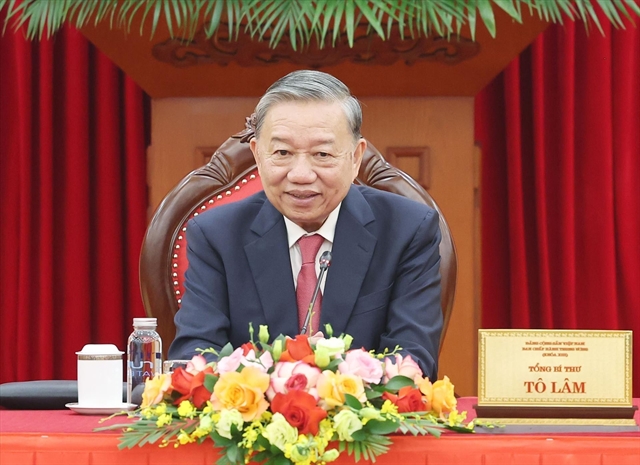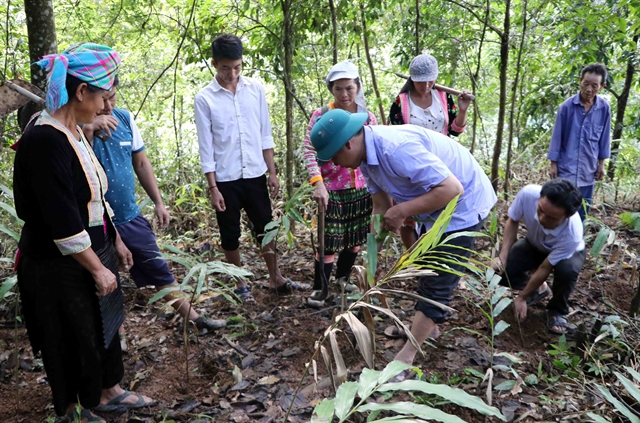 Politics & Law
Politics & Law


|
| Ethnic minority people in the northern province of Lai Châu Province's Nậm Nhùn District learn how to grow purple amomum, a medical plant, which could bring high economic value. — VNA/VNS PhotoCông Tuyên |
HÀ NỘI — The lives of ethnic minority people could be improved and gap between ethnic and mountainous region and others narrowed once a master plan get approval from the National Assembly.
A draft resolution on socio-economic development for the ethnic minority, mountainous region, and difficult regions in the 2021-25 period was mulled over by the National Assembly Standing Committee at the ongoing 37th session on Wednesday.
According to Đỗ Văn Chiến, head of the NA Committee for Ethnic Minority Affairs, the plan was essential to overcome shortcomings and promote the comprehensive development of ethnic minority people.
“The implementation of the project will contribute to increasing incomes for people, contributing to sustainable poverty reduction and basically solving some pressing issues of people living in extremely difficult socio-economic regions,” he said.
Among the 54 ethnic groups in Việt Nam, 53 are minorities with more than 13 million people, accounting for 14.6 percent of the country’s population. Ethnic minorities are living in 56 of the 63 provinces and cities nationwide.
Although the ethnic minority and mountainous areas in the northwest, Central Highlands, southwestern and western central coastal regions hold strategic position in the country’s socio-economic development strategy as well as guarantee security, they still have with lowest quality of human resources, Chiến said.
He also said the regions had lowest access to basic social services and a high poverty rate.
Chiến blamed this on the fact the ethnic minority people live in the border and mountainous areas with severe climate and poor infrastructure.
High cost of production and circulation of goods have made it difficult to attract social resources for socio-economic development.
The low efficiency of using investment capital and failure to exploit the potentials of the regions has also deterred their development.
Thanks to implementation of policy to support infrastructure development for ethnic minority and mountainous areas and poverty reduction models, the living standards of local residents has improved remarkably.
One such model is a fish farm built in the reservoir of the hydro power plant in Lai Châu which provides employment and salaries for a number of residents in the Than Uyên District.
In 2018, it helped see a reduction of 5 per cent of the number of poor households living in poverty compared to the previous year.
By the end of last year, there were 24,195 poor households, accounting for 25 per cent of the total households in the province.
In 2018, two districts, Tân Uyên and Than Uyên, were no longer on the list of the poor districts of the country.
Hà Ngọc Chiến, chairman of Ethnic Council, said the majority of council members agreed with the necessity of building the master plan as mentioned in the Government’s report.
“It is essential to have a policy strong enough to attract investment in these regions, aiming at narrowing the development and income gap,” he said.
Basing on supervisory results on the implementation of policies to support socio-economic development for ethnic minority and mountainous areas in 2016-18 period, Chiến said, the project would help enhance the effectiveness of policies and investment resource of the State and society.
The total capital for the project was estimated at VNĐ335.4 trillion at the minimum level.
However, the ethnic council proposed the Government to clarify the foundation for resource estimate because the project failed to show list of investment.
The council also suggested the Ministry of Planning and Investment to make a report on resource assessment before submitting to the NA for approval.
The Government should make clear the State budget spending increase compared with the 2011-22 period and how to guarantee the investment resource.
Chiến said the Ethnic Council proposed the Government to amend the project and submit to the eight session of National Assembly for consideration.
Construction Law
Earlier the same day, Minister of Construction Phạm Hồng Hà was questioned by standing committee members on lax management of construction violations.
Nguyễn Thanh Hải, head of the chairwoman of the National Assembly's Ombudsman Committee, said many individuals and organisations that violated construction regulations were punished for their violations, but the constructions were not dismantled.
“Such management would make people lose their trust,” she said, adding that works that violate construction law should be stopped and dismantled if it affects people's lives.
NA Judicial Committee head Lê Thị Nga shared the concerns.
“If any ordinary citizen who put construction materials at their doors, urban management force would give a warning right away. But many huge construction works that violate the law still exist and the owners of such works are only given fines. Who would be responsible for such violations?” she said.
Minister Phạm Hồng Hà acknowledged the concerns were completely reasonable.
"Such limitations in the field of construction come from two factors - regulations and law enforcement, which are poorly implemented. We will try to address," he said.
Also in the discussion session, some participants said it was necessary to revise the Construction Law and relocate construction works which are intertwined in residential areas, affecting people's lives and health.
Hải from the Ombudsman Committee cited the case of the Rạng Đông factory fire and said many production projects are located in residential areas such as extracting gas, or flammable materials and explosives trading.
"With existing construction works that are causing pollution to the surrounding residential areas, relevant authorities have to strictly comply with the Prime Minister's Decree 130 on relocation from urban areas and residential areas," she said. — VNS